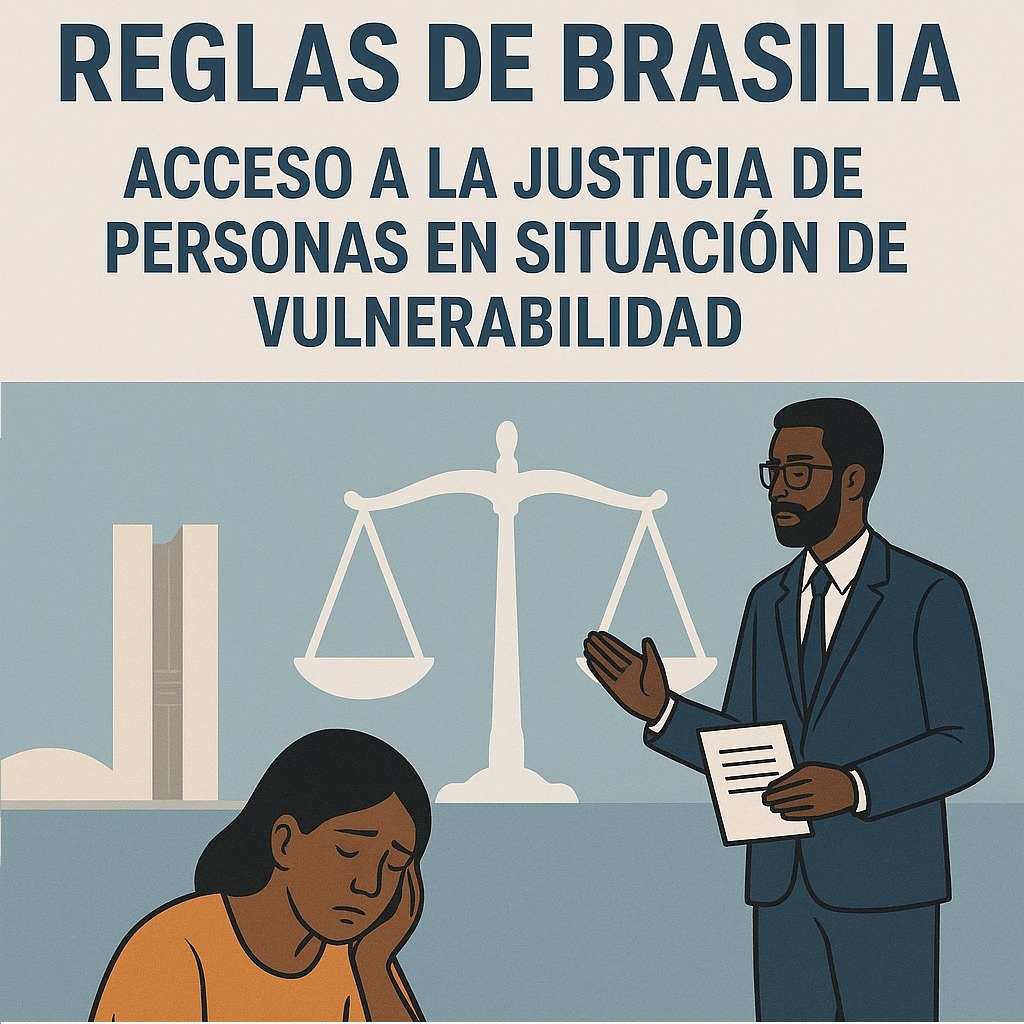The Brasilia Rules: Access to Justice for VulnerablePeople
DOI:
https://doi.org/10.37711/RJPDD.2025.2.1.8Keywords:
human rights, Brasilia Rules, inclusiveness, justice, vulnerabilityAbstract
The implementation of the Brasilia Rules is essential to ensure access to justice for vulnerable people in Latin America. This study was qualitative in nature, descriptive-analytical in type, based on documentary and jurisprudential analysis of academic research published in indexed scientifc journals, which were processed using the Atlas.ti qualitative data analysis program. To interpret the results, categories of analysis were used, such as structural barriers, judicial inclusion, institutional will, judicial training, perceived impact, and regulations. Although the Rules have been formally
incorporated into national regulatory frameworks, structural inequalities, institutional resistance, and technological gaps persist, especially in rural areas. Similarly, the countries analyzed also face signifcant challenges, such as territorial inequality in implementation, lack of resources, and the absence of sustained public policies. There has been evidence of regulatory inflation with practical defcits and weak sustainability of the measures adopted. Effective
access to justice still depends on political will, budget allocation, and ongoing training. The Brasilia Rules represent progress, but their real impact requires coordinated implementation, with citizen participation and constant external evaluation.
Downloads
References
Aarón, M., Choles, P., y Solano, A. (2016). Representación del Proceso Formativo de una institución Etnoeducativa a través de la Técnica del Modelo Gráfico y Descriptivo usando Diagramas de influencia y de Forres-ter. Información tecnológica, 27(3), 81-92. https://dx.doi.org/10.4067/S0718-07642016000300008
Amparo en Revisión 356/2020. (12 de noviembre de 2014). Suprema Corte de Justicia de la Nación. https://www.scjn.gob.mx/sites/default/files/listas/documento_dos/2021-08/AR-356-2020-16082021.pdf
Argés, J. (2018). El acceso a la justicia concebido como derecho humano imperativo (ius cogens). Derecho global. Estudios sobre derecho y justicia, 3(8), 73-92. https://doi.org/10.32870/dgedj.v0i8.145
Balanta, P., Estrada, R., Rodríguez, F., y Rodríguez, N.(2014). Configuración de la noción de discapacidad en un contexto de vulnerabilidad en Bogotá. Análisis interdisciplinar. Editorial Universidad del Rosario. https://doi.org/10.7476/9789587384758
Barahona, G., y Barzola, Y. (2024). La intervención social en personas con situaciones vulnerables. Revista de Cien-cias Humanísticas y Sociales ReHuSo, 9(2), 77-91. https://doi.org/10.33936/rehuso.v9i2.6269
Bernales, G. (2019). El acceso a la justicia en el sistema interamericano de protección de los derechos humanos. Ius et Praxis, 25(3), 277-306. https://dx.doi.org/10.4067/S0718-00122019000300277
Bregaglio, R. (2014). Alcances del mandato de no discriminación en la Convención sobre los Derechos de las Per-sonas con Discapacidad. En Salmón, E. y Bregaglio, R. (Eds.), Nueve conceptos claves para entender la Convención sobre los Derechos de las personas con discapacidad (pp. 73-98). https://www.corteidh.or.cr/tablas/32092.pdf
Burgos, A. (2013). El acceso a la justicia de grupos en condición de vulnerabilidad y las reglas de Brasilia. Revis-ta digital de la Maestría en Ciencias Penales, (5), 349-396. https://www.pensamientopenal.com.ar/doctrina/39356-acceso-justicia-grupos-condicion-vulnerabilidad-y-reglas-brasilia
Carastathis, A. (2016). Intersectionality. Origins, Contestations, Horizons. University of Nebraska Press. https://www.researchgate.net/publication/321992533
Carrera, M., y Escalante, J. (2017). Las Reglas de Brasilia. Su impacto en la jurisprudencia penal. Revista de Dere-cho Penal y Criminología, 35(1), 45-67. https://www.pensamientopenal.com.ar/system/files/2019/12/doctrina48366.pdf
Casación N.º 1672-2017/Puno. (2017). Corte Suprema de Justicia de la República, Sala Penal Permanente. https://static.legis.pe/wp-content/uploads/2018/10/Casacion-1672-2017-Puno-Legis.pe_.pdf
Cho S., Crenshaw, K., y McCall, L. (2013). Toward a Field of Intersectionality Studies: Theory, Applications, and Praxis. Signs. Journal of Women in Culture and Society, 38(4), 785-810. https://www.jstor.org/sta-ble/10.1086/669608
Comisión Interamericana de Derechos Humanos (2021). Situación de derechos humanos en Brasil (OEA/Ser.L/V/II. Doc.9). https://www.oas.org/es/cidh/informes/pdfs/Brasil2021-es.pdf
Comisión Interamericana de Derechos Humanos (2023). Compendio sobre la reparación integral con perspectiva de género en contextos de justicia transicional (OEA/Ser.L/V/II. Doc.23). https://www.oas.org/es/cidh/informes/pdfs/2024/compendio-reparaciones-genero-esp.pdf
Conferencias Magistrales. (2024). Las 100 Reglas de Brasilia: Herramienta fundamental para garantizar el acceso a la Justicia de manera efectiva y equitativa. Instituto Superior de la Judicatura de Panamá. https://www.cumbrejudicial.org/sites/default/files/2025-02/conferencias-magistrales-2024-reglas-de-brasilia-herramienta-fundamental-para-el-acceso-a-la-justicia-de-manera-efectiva-y-equitativa-1_1.pdf
Consejo de la Judicatura Federal. (2020). Acuerdo general 08/2020, del pleno del Consejo de la Judicatura Federal. https://www.cjf.gob.mx/resources/index/infoRelevante/2020/pdf/AcuerdoGeneral8_2020.pdf
Consejo de la Judicatura Federal. (2020). Acuerdo general 12/2020, del Pleno del Consejo de la Judicatura Federal. https://www.cjf.gob.mx/resources/index/infoRelevante/2020/pdf/AcuerdoGeneral12_2020.pdf
Corte Interamericana de Derechos Humanos. (2008). Reglas de Brasilia sobre el acceso a la justicia de las personas en situación de vulnerabilidad. https://www.corteidh.or.cr/tablas/r30061.pdf
Corte Interamericana de Derechos Humanos. (2008). Reglas de Brasilia sobre el acceso a la justicia de las personas en situación de vulnerabilidad. https://www.corteidh.or.cr/tablas/r30061.pdf
Cumbre Judicial Iberoamericana. (2014). Informe Reglas de Brasilia. Asamblea Plenaria de la XVII Cumbre Judi-cial Iberoamericana. https://www.cumbrejudicial.org/biblioteca-de-documentos?combine=reglas%20de%20brasilia&term_node_tid_depth=All&term_node_tid_depth_1=All&term_node_tid_depth_2=All&page=2
Dabove, M. (2024). ¿Somos todos vulnerables en la vejez? Aportes de la teoría del derecho para la toma de deci-siones judiciales. Revista Derecho del Estado, (59), 1-32. https://doi.org/10.18601/01229893.n59.01
Díaz, R. (2018). Vulnerabilidad y riesgo como conceptos indisociables para el estudio del impacto del cambio climá-tico en la salud. Región y sociedad, 30(73), 0006. https://doi.org/10.22198/rys.2018.73.a968
Espinosa Lara, D. (2015). Grupos en situación de vulnerabilidad. Comisión Nacional de los Derechos Humanos (Colección de textos sobre Derechos Humanos). Comisión Nacional de los Derechos Humanos. http://appweb.cndh.org.mx/biblioteca/archivos/pdfs/fas_CTDH_GruposVulnerabilidad1aReimpr.pdf
Fernández, W. (2019). Protección de la familia y acceso a la justicia de los migrantes en el Perú. Ius Humani. Revista de Derecho, 8, 245-267. https://doi.org/10.31207/ih.v8i0.223
García, S. (2019). Los sujetos vulnerables en la jurisprudencia "transformadora" de la Corte Interamerica-na de Derechos Humanos. Cuestiones constitucionales, (41), 3-34. https://doi.org/10.22201/iij.24484881e.2019.41.13940
Gonet, P. (2020). Las 100 Reglas de Brasilia y el acceso a la justicia en Brasil. Revista Llapanchikpaq: Justicia, 1(1), 1-20. https://doi.org/10.51197/lj.v1i1.7
Grzanka, P. R. (2019). Systems of oppression. En Grzanka, P. R. (Ed.), Intersectionality: foundations and frontiers(pp. 1-5). Routledge. https://www2.kobe-u.ac.jp/~alexroni/pdf/zemi%20books/Intersectionality%20A%20Foundations%20and%20Frontiers%20Reader%20by%20Patrick%20R.%20Grzanka%20(Editor).pdf
Guerrero, R., Oliva, T., y Ojeda, M. (2017). Acercamiento al escenario de estudio fenomenológico en México: relato de experiencia. Rev Bras Enferm., 70(4),885-90. http://dx.doi.org/10.1590/0034-7167-2016-0601
Hasanbegovic, C. (2016). Violencia basada en el género y el rol del Poder JudicialGender-based Violence and the Role of the Judicial Power. Revista de la Facultad de Derecho, (40), 119-158. http://www.scielo.edu.uy/scielo.php?script=sci_arttext&pid=S2301-06652016000100006&lng=es&tlng=es
Hurtado, G. (2024). El acceso a la justicia de las poblaciones indígenas. Una necesidad desde el lenguaje. Lengua y Sociedad, 23(1), 177-192. https://doi.org/10.15381/lengsoc.v23i1.27276
Jabur, C. (2021). Una política «a medio camino». Reflexiones sobre la política para pueblos indígenas de contacto re-ciente en Brasil. Anthropologica, 39(47), 413-445. https://doi.org/10.18800/anthropologica.202102.016
Molina, R. (2005). La Discapacidad y su Inclusión Social: Un Asunto de Justicia. rev.fac.med. 53(4): 259-262. http://www.scielo.org.co/scielo.php?script=sci_arttext&pid=S0120-00112005000400007&lng=en
Otzen, T., y Manterola, C. (2017). Técnicas de Muestreo sobre una Población a Estudio. International Journal of Morphology, 35(1), 227-232. https://dx.doi.org/10.4067/S0717-95022017000100037
Oviedo, A. (2022). Inclusión, exclusión, justicia social. Revista Andina de Educación, 6(1), e100. https://doi.org/10.32719/26312816.2022.6.1.01
Peña, L. (2018). La sentencia en formato de lectura fácil: aplicable para todos. Hechos y Derechos, (47). https://revistas.juridicas.unam.mx/index.php/hechos-y-derechos/article/ view/12876/14426
Pezo, O., Choque, Y., y Calle, D. (2024). Las rutas y dinámicas sociales de las necesidades jurídicas y el acceso a la justicia para la gestión de conflictos en el sur del Perú. Derecho global. Estudios sobre derecho y justicia, 9(26), 201-221. https://doi.org/10.32870/dgedj.v9i26.713
Piña, L. (2023). El enfoque cualitativo: Una alternativa compleja dentro del mundo de la investigación. Revista Arbitrada Interdisciplinaria Koinonía,8(15), 1-3. https://doi.org/10.35381/r.k.v8i15.2440
Programa de las Naciones Unidas para el Desarrollo. (2005). Manual de Políticas Públicas para el Acceso a la Justicia. América Latina y el Caribe. http://inecip.org/wp-content/uploads/Inecip-Manual-Politicas-Publicas.pdf
Programa de las Naciones Unidas para el Desarrollo. (2022). Estrategia digital 2022 - 2025. https://digitalstrategy.undp.org/documents/Digital-Strategy-2022-2025-Full-Document_ES_Interactive.pdf
Ramírez, S. (2021). ¿Es el campo judicial un aspecto privilegiado para la lucha por los derechos indígenas en América latina? Revista Jurídica Derecho, 10(15), 193-208. http://www.scielo.org.bo/scielo.php?script=sci_arttext&pid=S241328102021000200011&lng=es&tlng=es
Ramos, D. (2019). Entendiendo la vulnerabilidad social: una mirada desde sus principales teóricos. Revista Estudios del Desarrollo Social: Cuba y América Latina, 7(1), 139-154. http://scielo.sld.cu/scielo.php?script=sci_arttext&pid=S230801322019000100139&lng=es&tlng=es
Redondo, M. (2019). El juez humanista: el nuevo guardián del derecho en el paradigma neoconstitucional. Cuestiones constitucionales, (40), 141-170. https://doi.org/10.22201/iij.24484881e.2019.40.13230
Resolución Administrativa N.º 000198-2020-CE-PJ. Aprueban adhesión a las Reglas de Brasilia sobre Acceso a la Justicia de Personas en Condición de Vulnerabilidad, disponiendo su aplicación por todos los jueces de la República, incluidos los jueces de paz (2020, 1 de agosto). Poder Judicial del Perú. Diario Oficial El Peruano. https://www.pj.gob.pe/wps/wcm/connect/00bf72804f9fc09abd1bbd6976768c74/R.+A.+N%C2%B0+000198-2020-CE-PJ.PDF?MOD=AJPERES&CACHEID=00bf72804f9fc09abd1bbd6976768c74
Ribotta, S. (2012). Reglas de Brasilia sobre Acceso a la Justicia de las Personas en Condición de Vulnerabilidad. Vulnerabilidad, pobreza y acceso a la justicia. Revista Electrónica Iberomaericana, 6(2), 1-37. https://www.urjc.es/images/ceib/revista_electronica/vol_6_2012_2/REIB_06_02_04Ribotta.pdf
Romero, M. (2018). Introducing intersectionality. Polity Press. https://www.politybooks.com/bookdetail?book_slug=introducingintersectionality--9780745663661
Ruiz, N. (2012). La definición y medición de la vulnerabilidad social. Un enfoque normativo. Investigaciones geográficas, (77), 63-74. http://www.scielo.org.mx/scielo.php?script=sci_arttext&pid=S018846112012000100006&lng=es&tlng=es
Salazar, J. (2022). 100 reglas de Brasilia: Propuestas para asegurar el derecho de acceso a la justicia de las personas en condiciones de pobreza. Rev. investig. cient. Erga omnes 2022, 2, 1-11. https://revistas.unh.edu.pe/index.php/rceo/article/view/87/1013
Sentencia del Tribunal Constitucional. (2004, 24 de marzo). Sala Primera del Tribunal Constitucional (Alva Orlandini, presidente; Aguirre Roca y Gonzales Ojeda). https://www.tc.gob.pe/jurisprudencia/2004/00858-2003-AA.html
Sentencia T-025/04. (2004, 22 de enero). Agencia oficiosa en tutela-Asociaciones de desplazados. Corte Constitucional de Colombia. https://www.corteconstitucional.gov.co/relatoria/2004/t-025-04.htm
Sentencia T-301/16. (2016, 9 de junio). Procedencia de tutela para amparar el derecho a la IVE. Corte Constitucional de Colombia. https://derechoalaborto.com/conoce-las-sentencias/sentencia-t-301-de-2016/
Sentencia T-762/15. (2015, 16 de diciembre). Desarticulación de la Política criminal. Corte Constitucional de Colombia. https://publicaciones.eafit.edu.co/index.php/nuevo-foro-penal/article/view/4362/3646
Sousa, V. (2020). El acceso a la administración de justicia para las personas con discapacidad visual en Panamá. Conrado, 16(76), 443-447. http://scielo.sld.cu/scielo.php?script=sci_arttext&pid=S1990-86442020000500443&lng=es&tlng=es
Timana, M., y Vega, A. (2023). Las 100 Reglas de Brasilia como herramienta para enfrentar las barreras de acceso a la justicia: el enfoque de género como factor de vulnerabilidad. Revista Llapanchikpaq Justicia, 5(7), 181-202. https://doi.org/10.51197/lj.v5i7.871
Valdez, A., Fernández-Silva, C., Bittner, C., y Mancilla, C. (2021). Aproximaciones al concepto de vulnerabilidad desde la bioética: una revisión integradora. Persona y Bioética, 25(2), e2522. https://doi.org/10.5294/pebi.2021.25.2.2
Veiga, J., De la Fuente, E., y Zimmermann, M. (2008). Modelos de estudios en investigación aplicada: conceptos y criterios para el diseño. Med Segur Trab, 210, 81-88. https://scielo.isciii.es/pdf/mesetra/v54n210/aula.pdf
World Justice Project. (2024). Uruguay ocupa el puesto 24 de 142 en el World Justice Project Rule of Law Index.https://worldjusticeproject.org/sites/default/files/documents/Uruguay_ES.pdf

Downloads
Published
Issue
Section
License
Copyright (c) 2025 Ivan Andy Ullauri Ocampo

This work is licensed under a Creative Commons Attribution 4.0 International License.
a. Authors retain copyright to their published works, granting the journal the right of first publication.
b. Authors retain their trademark and patent rights, as well as rights to any process or procedure described in the article.
c. Authors retain the right to share, copy, distribute, perform, and publicly communicate the article published in the journal (e.g., by placing it in an institutional repository or publishing it in a book), with acknowledgment of its initial publication in the journal.
d. Authors retain the right to republish their work, to use the article or any part thereof (e.g., in a compilation of their work, conference notes, a thesis, or a book), provided they acknowledge the original source of publication (authors of the work, journal, volume, issue, and date).














